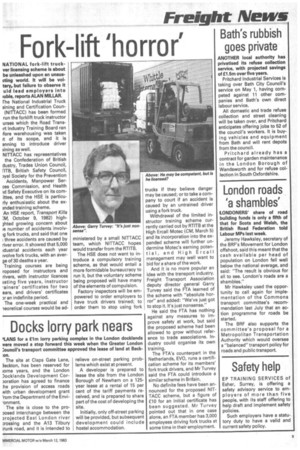Fork-lift 'horror'
Page 11

If you've noticed an error in this article please click here to report it so we can fix it.
NATIONAL fork-lift truckver licensing scheme is about be unleashed upon an unsuscting world. It will be voltory, but failure to observe it uld lead employers into luble, reports ALAN MILLAR. The National Industrial Truck 3ining and Certification Coun(NITTACC) has been formed run the forklift truck instructor urses which the Road Trans
■ rt Industry Training Board ran fore warehousing was taken it of its scope, and it is arming to introduce driver lining as well.
NITTACC has representatives the Confederation of British dustry, Trades Union Council, IITB, British Safety Council, wal Society for the Prevention Accidents, Manpower Serces Commission, and Health Id Safety Executive on its cornittee, and the HSE is particurly enthusiastic about the exmded training scheme.
An HSE report, Transport Kills Ai, October 9, 1982) high3hted growing concern about re number of accidents involvig fork trucks, and said that one three accidents are caused by river error. It showed that 5,000 idustrial accidents each year ivolve fork trucks, with an averge of 30 deaths a year.
Training courses are being roposed for instructors and rivers, with instructor licences isting five years, instructor -ainers' certificates for two ears, and drivers' certificates )ran indefinite period.
The one-week practical and leoretical courses would be ad ministered by a small NITTACC team, which NITTACC hopes would transfer from the RTITB.
The HSE does not want to introduce a compulsory training scheme, as that would entail a more formidable bureaucracy to run it, but the voluntary scheme being proposed will have many of the elements of compulsion.
Factory inspectors will be empowered to order employers to have truck drivers trained; to order them to stop using fork trucks if they believe danger may be caused; or to take a company to court if an accident is caused by an untrained driver using a fork truck.
Withdrawal of the limited instructor training scheme currently carried out by RTITB at the High Ercall Motec (CM, March 5) and its incorporation into the expanded scheme will further undermine Motec's earning potential, and High Ercall management may well want to bid for a share of the work.
And it is no more popular an idea with the transport industry. Freight Transport Association deputy director general Garry Turvey said the FTA learned of the scheme with "absolute horror" and added: "We've just got to stop it. It's just nonsense."
He said the FTA has nothing against any measures to improve safety at work, but said the proposed scheme had been allowed to grow without reference to trade associations. Industry could organise its own training.
The FTA's counterpart in the Netherlands, EVO, runs a certification scheme for its members' fork truck drivers, and Mr Turvey said the FTA could introduce a similar scheme in Briiain.
No definite fees have been announced for the proposed NITTACC scheme, but a figure of £10 for an initial certificate has been suggested. Mr Turvey pointed out that in one case alone, an FTA member has 3,000 employees driving fork trucks at some time in their employment.




























































































